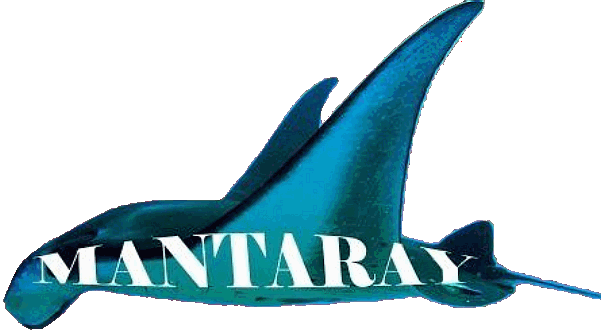|

Rémi
Parmentier joined the Global Ocean Commission as Deputy Executive
Secretary in October 2013 to reinforce the Secretariat. Previously he had
acted as Senior Policy Adviser to the Commission. A veteran of the
international environmental movement with 40 years of experience in the
field, Rémi has worked for many years on behalf of NGOs within
multilateral bodies, to promote the environmental and sustainability
agenda and values.
Rémi
Parmentier specialises in political strategy and advocacy, and campaign development, and likes to define himself as a “free-lance agitator.”
“Regardless of whether the work is for an NGO, business, a government or international agency, I consider my work as challenging their practice and their habits with a view to improving them, bringing added value, thanks to our
[Varda Group] unique prisma.”
Rémi has participated in countless international fora over many years. These include for example: the International Atomic Energy Agency
(IAEA), the International Maritime Organisation (IMO), Meetings of the Parties to the
Nuclear Non-Proliferation Treaty
(NPT), the Convention on Biological Diversity (CBD), the UN Framework Convention on Climate Change
(UNFCCC), the London Convention 1972, the OSPAR Commission, Ministerial Conferences for the Protection of the North Sea, UNEP’s Barcelona and Cartagena Conventions,
UNEP Governing Council, the International Whaling Commission, CITES, the International Commission for the Conservation of Atlantic
Tuna
(ICCAT), the World Bank, the Intergovernmental Negotiating Body for the Framework Convention on Tobacco Control, the World Health Assembly, the European Parliament and the European Commission, among others.
Rémi was a founding member of Greenpeace International (1979) and several
Greenpeace national organisations, including
Greenpeace France (1977), Greenpeace
Spain (1984), Greenpeace International’s Mediterranean Project (1986) and Greenpeace Latin America (1987). Among many other projects, in the 1970s he was a crew member of the first legendary voyages of the ship Rainbow Warrior (see “Then and Now” Parts I,II and III, written by Rémi in 2003). He has undertaken field investigations on environmental and nuclear issues in a number of countries and regions, including Western
Europe, Russia, North and Latin America, the South Pacific and
Asia. He is considered the main architect of the worldwide ban on the dumping of industrial and radioactive wastes at sea adopted by the Parties to the London Convention in 1993, a Greenpeace campaign which spanned 15 years. He was a member of Greenpeace International’s Political Team since its creation in 1988, and the organization’s Political Director for several years until he formed the Varda Group with Kelly Rigg in 2003.
With more than thirty five years in the environmental movement, Rémi has known and worked with many of the key players in environmental policy including senior staff at the UN and other intergovernmental organizations, government ministers and representatives, NGO leaders, journalists, and independent policy experts. In his last Greenpeace years, as Greenpeace International’s Political Director, he worked on international trade and the environment, and participated in the Ministerial Conferences of the World Trade Organisation
(WTO) in Seattle in November, 1999 and Doha, Qatar in November 2001. He also represented Greenpeace at the 2002
Johannesburg World Summit on Sustainable Development
(WSSD) and its preparatory process.
From 2005 to 2010, Rémi came back to one of the first international issues he had ever worked on – the conservation of whales – at the request of the Pew Environment Group on behalf of whom he organized the Symposium on the State of Whale Conservation in the 21st Century held in April 2007 at UN Headquarters and the Second Pew Symposium, “A change in climate for whales”, held at the
United Nations University,
Tokyo, in January 2008 and the Pew
Whales Commission in 2009. Since May 2007, Rémi has been a Senior Policy Adviser of the
Pew Environment
Group, working on marine biodiversity issues.
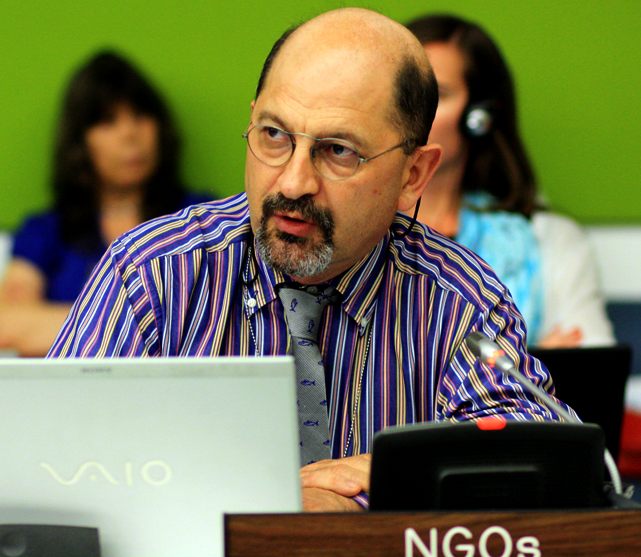
THE
GOC'S
OBJECTIVES The objective of the Global Ocean Commission is to address
the issues herein by formulating ‘politically and technically feasible
short, medium, and long-term recommendations.
These final recommendations were to be published in early 2014, shortly before the UN General Assembly
began discussions on protecting high seas biodiversity – a commitment made at the Rio+20 summit
in 2013. The work of the Commission thus focuses on four key tasks:
1. To examine key threats, challenges, and changes to the ocean in the 21st century, and identify priority issues. The Commission will utilise both scientific and economic evidence, drawing on existing reports from world experts, as well as commencing original research in partnership with other organisations.
2. To review the effectiveness of the existing legal framework for the high seas in meeting these challenges. According to the Commission, this means a special focus on the effectiveness of regional fisheries management organisations, particularly with respect to their accountability, transparency, and performance. It also means reviewing the governance gap on biodiversity conservation and analysing options for
combating IUU
fishing. The Commission will also assess the suitability of the existing legal regime for regulating emerging uses of the global ocean.
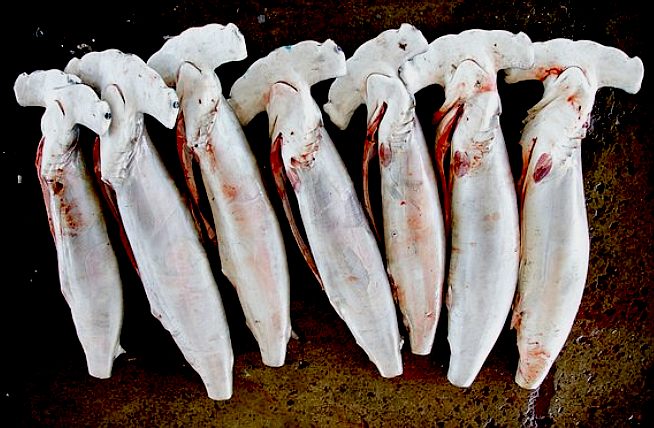
SHARK
FINNING - Due to the trade in shark fin for soup, the value of the fins far exceeds that of the rest of the shark’s body. Shark fins can fetch up to $650/Kg whereas the rest of the shark is valued at a much lower $0.85/Kg meaning fishermen are unwilling to waste valuable boat space with the less profitable meat. Consequently, the majority of fins that reach the table have been harvested using the practice known as ‘finning.’ This involves the shark being hauled aboard, having its fins and tail sliced off – commonly while still alive – then being dumped back into the ocean to drown or bleed to death, a process which can take up to 50 minutes.
Apart from the inhumane treatment of animals, this process is hugely wasteful. The fins and tail represent only 5% of the animal, meaning that 95% is wasted. Although there are laws against finning, in truth these have proven impossible to enforce as it occurs in the open ocean and through poorly regulated ports.
Sharks are often hooked accidentally on longlines as bycatch, but the high value of the fins also means that they are finned and dumped for additional profit rather than being released. This too, increases the number of sharks being killed.
Official figures estimate that up to 73 million sharks are killed for their fins every year. Some believe the real figure may be much higher when considering unreported catch figures. Sharks occupy the top position in the oceanic ecosystem and their role as ‘Apex Predators’ has led to them evolving to live a long time and reproduce very slowly.
Without sharks performing the role of a top predator – a role they have fulfilled for over 400 million years – the rest of the ocean ecosystem will be thrown out of balance. This is what is known as a cascade effect. The lower levels of the food chain will be disrupted with devastating impacts for biodiversity and ocean productivity. Marine life and marine industries face an uncertain future as a result.
Some species of shark can live over 100 years but may not reach reproductive age until around 25 years and give birth to only a few pups once every two years. For these reasons, their populations are extremely sensitive to unsustainable fishing.
3. To engage with interested parties around the world, as well as the general public. The Commission will connect with fishers, military and merchant navies, recreational sailors, seafood companies, conservation groups and the emergent seabed mining business. The Commission also aims to raise understanding among policymakers, economists and other groups, including the general public, of the implications should high seas issues not be reformed.
4. To make recommendations regarding ‘cost-effective, pragmatic and politically feasible reforms of high seas governance, management and enforcement.’ While the threat analysis will take account of external issues such as climate change, recommendations will focus on reforms that can be achieved by evolving high seas governance. Some may concern the fundamental legal framework under which the global ocean is governed, whereas others may focus on improving the effectiveness of existing mechanisms.

The Global Ocean Commission
Somerville College
Woodstock Road
Oxford, OX2 6HS Tel:
UK+44 (0) 1865 280747
GLOBAL
OCEAN COMMISSIONERS - CO-CHAIRS
|

|

|
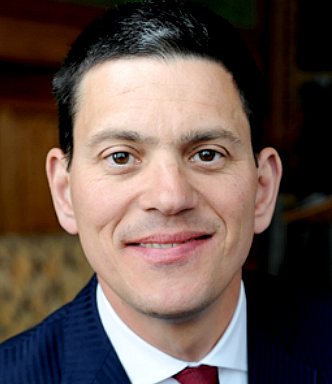
|
|
José María Figueres |
Trevor Manuel |
David
Miliband |
THE
COMMISSIONERS
|

|

|

|

|

|

|

|
|
Carol
Browner |
Victor
Chu |
Obiageli Ezekwesili |
Luiz
Furlan |
Vladimir
Golitsyn |
Robert
Hill |
Yoriko
Kawaguchi |
|
. |
. |
. |
. |
. |
. |
. |
|

|

|

|

|

|
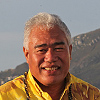
|

|
|
Pascal
Lamy |
Paul
Martin |
Sri
Mulyani Indrawati |
Cristina
Narbona |
Ratan
Tata |
Foua
Toloa |
Andrés
Velasco |
GOC's
SECRETARIAT
|

|

|

|

|

|

|
|
Simon
Reddy |
Rémi Parmentier |
Clare
Brennan |
Kristian Teleki |
Inés de Águeda |
Sarah Gardner |
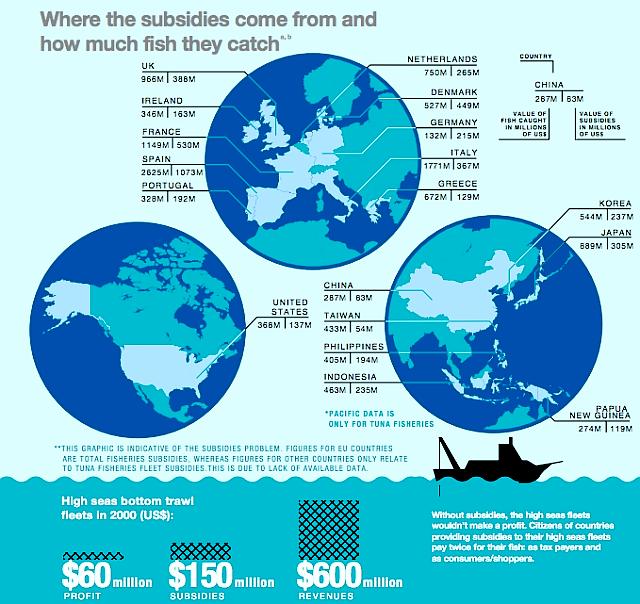
RICH COUNTRIES PAY ZOMBIES $5 BILLION A YEAR IN SUBSIDIES TO PLUNDER THE OCEANS
- Without the subsidies, most of these businesses would fail. So thoroughly have industrial fleets
over-fished the seas that they couldn’t afford the fuel to travel the ever-increasing distance needed to catch the same amount of fish if their governments didn’t lavish public funds upon them.
In economics, you’d call these zombies - unprofitable companies that would fail if governments didn’t prop them up. There are two big problems with zombies. First, they take resources that could go to support new, productive companies. And by subsidizing zombies, governments allow them to keep prices low, driving productive companies out of business. 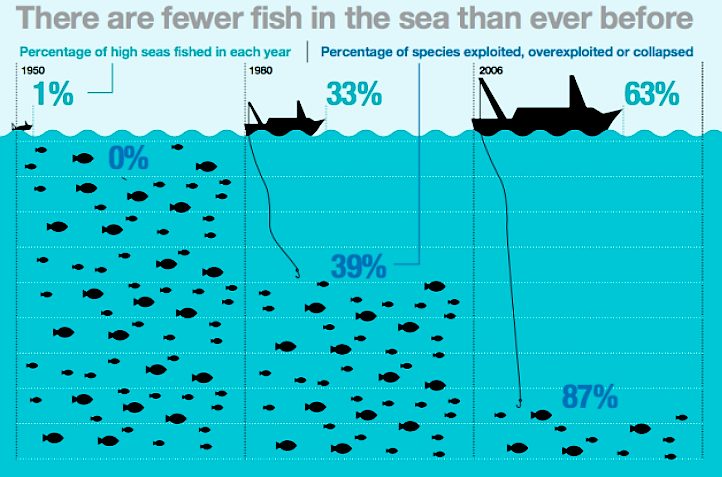
RICH COUNTRIES PAY ZOMBIES $5 BILLION A YEAR IN SUBSIDIES TO PLUNDER THE OCEANS
- If industrial fleets weren’t subsidized, they’d go out of business. Small-scale fisheries that don’t need enormous amounts of fuel to catch huge hauls of
fish - i.e. the ones using sustainable fishing practices - would then in theory thrive. Many of these fishermen are in poor countries whose governments can’t afford to compete in the industrial looting.
Worse, there’s a double-whammy zombie effect going on in the fishing context. Government subsidies to highly destructive industrial fleets don’t just deprive small-scale fishermen of finite taxpayer dollars and edge them out of the market with cheap prices; they also rob them of current and long-term fishing stocks.





LINKS
& REFERENCE
Pew
Trusts environment
UPI
Science News 2014 June group calls for reforms to protect oceans from
fishing drilling and pollution
Telegraph
US-royal-tour-Prince-of-Wales-makes-plea-for-cleaner-oceans
Prince-of-Wales-speech-hrh-the-prince-of-wales-event-titled-plastic-the-marine-environment-scaling
Daily
Mail
Charles-horrified-toll-plastic-dumped-sea-Prince-Wales-plea-solve-issue-sake-future-generations
The
Guardian environment 2015 March 19
Prince-charles-calls-for-end-to-dumping-of-plastic-in-worlds-oceans
http://abcnews.go.com/US/wireStory/prince-charles-speaks-dangers-plastic-waste-oceans-29736519
Global
Ocean Commission
National
Geographic news 2014 June
Global-ocean-commission-report-high-seas-fishing-environment
Virgin
leadership and advocacy introducing global ocean commission
Wikipedia
European_Commissioner_for_Maritime_Affairs_and_Fisheries
Reuters
2013 US oceans new global group to clean up
National
Geographic 2014
global-ocean-commission-report-high-seas-fishing-environment
http://www.pewtrusts.org/en/topics/environment
http://en.wikipedia.org/wiki/European_Commissioner_for_Maritime_Affairs_and_Fisheries
http://www.virgin.com/unite/leadership-and-advocacy/introducing-global-ocean-commission
http://www.scienceifl.com/ocean-plastic-pollution.htm
http://abcnews.go.com/US/wireStory/prince-charles-speaks-dangers-plastic-waste-oceans-29736519
http://www.globaloceancommission.org/
http://time.com/3750375/environment-prince-charles-oceans/
http://news.nationalgeographic.com/2015/03/150318-prince-charles-oceans-trash-plastic-britain/
http://en.wikipedia.org/wiki/Global_Ocean_Commission
http://www.itv.com/news/2015-03-18/prince-charles-makes-impassioned-plea-for-oceans-clean-up/
ACID
OCEANS - ARCTIC
- ATLANTIC - BALTIC
- BERING
- CARIBBEAN - CORAL - EAST
CHINA - ENGLISH CH
GULF
MEXICO
- GOC - INDIAN
- MEDITERRANEAN -
NORTH SEA - PACIFIC
- PERSIAN GULF - SEA
JAPAN - STH
CHINA
PLANKTON
- PLASTIC
- PLASTIC
OCEANS - UNCLOS
- UNEP
- WWF
|





























